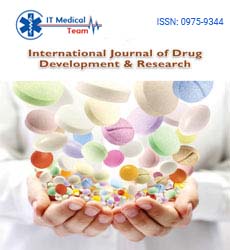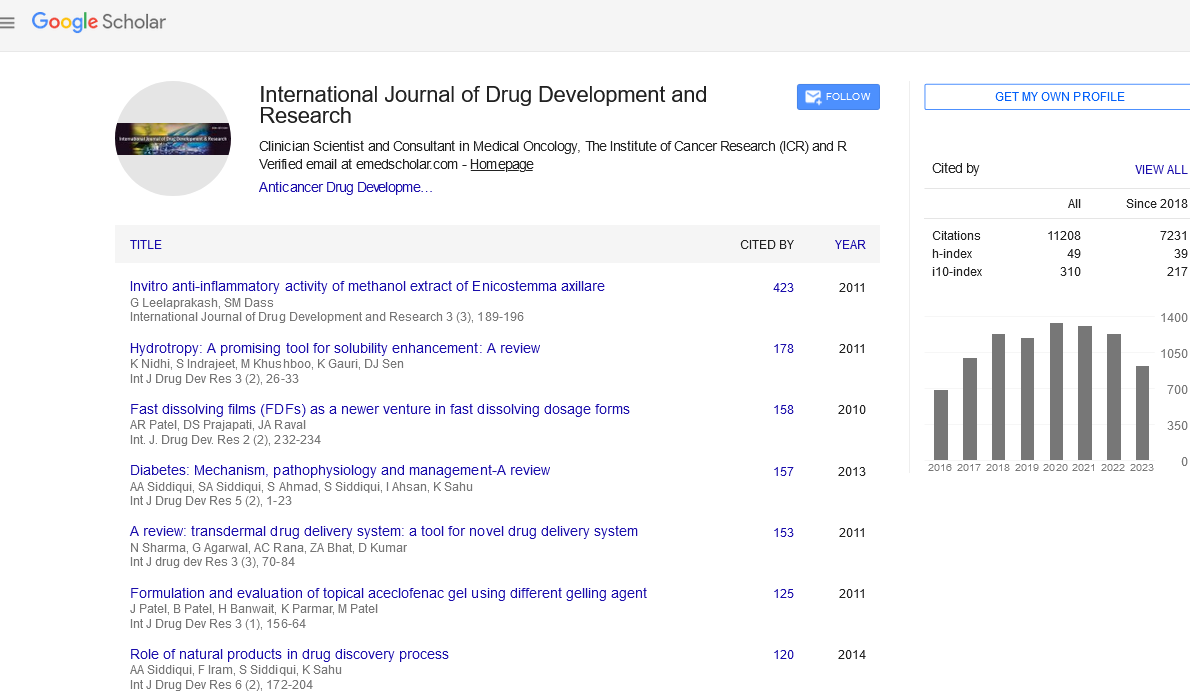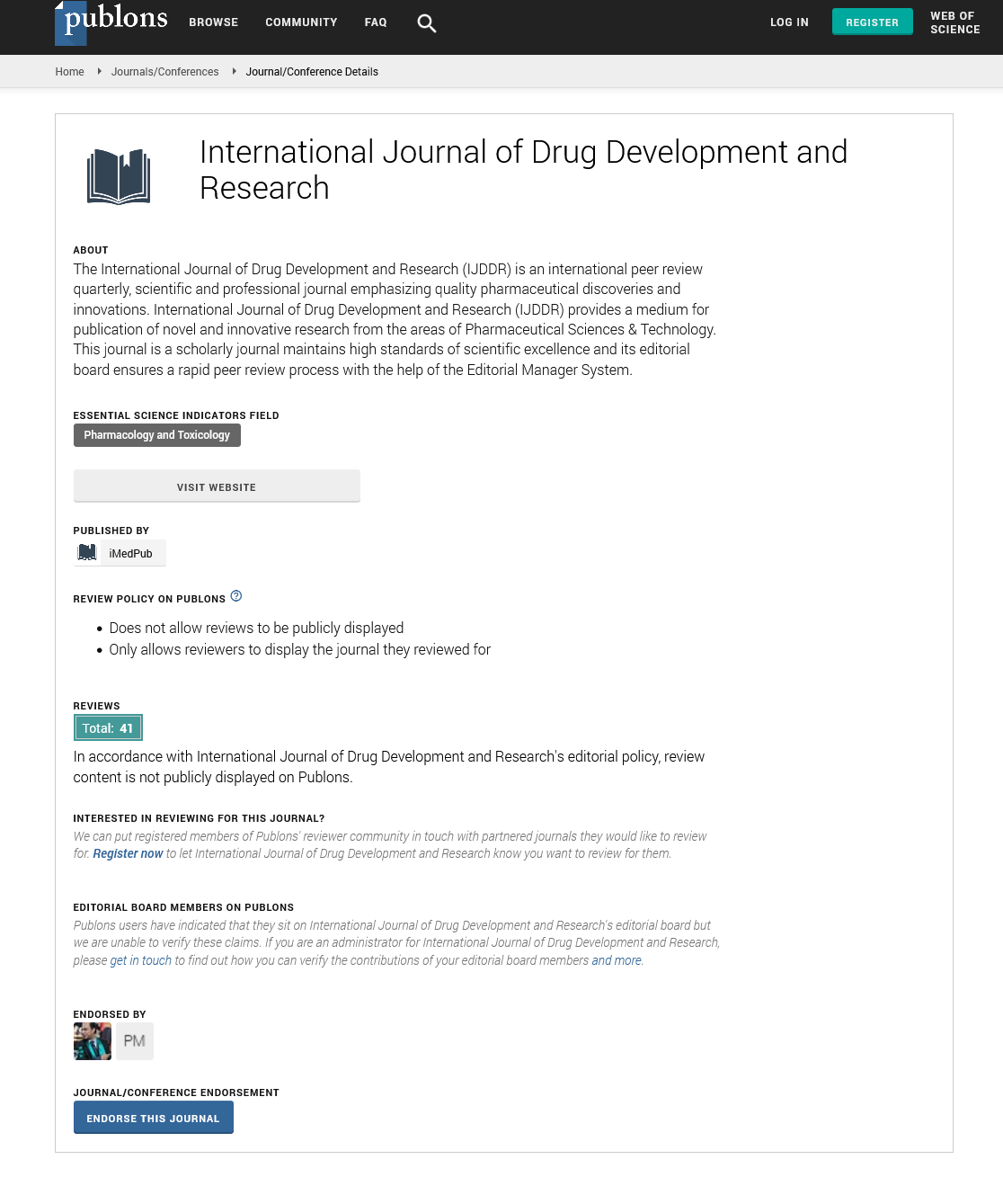Opinion - (2024) Volume 16, Issue 1
Revolutionizing SVT Treatment: A Comprehensive Guide to Drug Therapies
Boweras Rilasy*
Department of Drug Therapeutics, University of Bordeaux, Bordeaux, France
*Correspondence:
Boweras Rilasy, Department of Drug Therapeutics, University of Bordeaux, Bordeaux,
France,
Email:
Received: 02-Jan-2024, Manuscript No. ijddr-24-14490;
Editor assigned: 05-Jan-2024, Pre QC No. ijddr-24-14490 (PQ);
Reviewed: 19-Feb-2024, QC No. ijddr-24-14490;
Revised: 30-Jan-2024, Manuscript No. ijddr-24-14490 (R);
Published:
08-Feb-2024
Introduction
Supraventricular Tachycardia (SVT) is a heart rhythm disorder
characterized by a rapid heartbeat originating above the heart's
ventricles. While various treatment options exist, the focus of
this article is on the revolutionary drugs that have emerged to
manage SVT effectively. These medications represent a
breakthrough in cardiology, offering patients new hope and
improved quality of life.
Description
Understanding SVT
Before delving into drug treatments, it's essential to grasp the
fundamentals of SVT. SVT occurs when abnormal electrical
pathways in the heart cause a rapid, regular heartbeat.
Symptoms may include palpitations, chest discomfort, dizziness,
and shortness of breath. While non-drug interventions like
lifestyle changes and catheter ablation are viable options, drug
therapies play a crucial role in managing SVT for many
individuals.
Adenosine: A first-line treatment
Adenosine stands out as a primary drug for SVT due to its
unique mechanism of action. As a naturally occurring nucleoside
in the body, adenosine slows down the heart rate by affecting
the electrical conduction system. Administered intravenously,
adenosine is particularly effective in terminating paroxysmal SVT
episodes.
Despite its efficacy, adenosine is a short-acting drug, and its
use is often limited to a clinical setting. Patients may experience
transient side effects, such as flushing, chest discomfort, and a
sense of breathlessness, but these effects typically resolve
quickly.
Beta-blockers: Targeting the adrenergic system
Beta-blockers, such as metoprolol and propranolol, have been
a cornerstone in treating various cardiovascular conditions,
including SVT. These drugs work by blocking the effects of
adrenaline, thereby reducing the heart rate and myocardial
contractility.
Beta-blockers are often prescribed for long term SVT
management, aiming to prevent the recurrence of episodes. The
use of beta-blockers requires careful consideration, as they may
not be suitable for individuals with asthma or certain cardiac
conditions. Additionally, side effects like fatigue and cold
extremities can impact the patient's quality of life.
Calcium channel blockers: Modulating electrical
activity
Calcium channel blockers, such as verapamil and diltiazem,
represent another class of drugs used in SVT management.
These medications interfere with calcium influx into the cardiac
cells, leading to decreased electrical activity and a reduced heart
rate.
Calcium channel blockers are especially effective in preventing
SVT episodes associated with specific triggers, such as exercise
or stress. However, caution is warranted in patients with certain
conditions, such as heart failure, as these drugs can exacerbate
the underlying issues.
Anti-arrhythmic medications: Tailored approaches
In more complex cases of SVT, anti-arrhythmic medications
like flecainide and propafenone may be considered. These drugs
work by stabilizing the electrical activity of the heart, preventing
the onset of abnormal rhythms.
Anti-arrhythmics require careful monitoring due to their
potential proarrhythmic effects, and their use is often reserved
for patients who do not respond well to other treatments or
those deemed suitable candidates based on thorough cardiac
assessments.
Newer agents: Emerging hope
The landscape of SVT treatment is continually evolving, with
researchers exploring novel drug therapies to enhance efficacy
and minimize side effects. One such emerging agent is
ranolazine, originally developed for angina treatment. Recent
studies suggest its potential in managing certain arrhythmias,
including SVT, by modulating ion channel activity.
While these newer agents hold promise, extensive research
and clinical trials are essential to validate their safety and
efficacy before widespread adoption in SVT management.
Personalized medicine in SVT treatment
The future of SVT treatment lies in personalized medicine,
tailoring interventions based on an individual's genetic makeup,
lifestyle, and specific cardiac characteristics. Genetic testing can
identify predispositions to certain arrhythmias, guiding
healthcare providers in choosing the most effective and safest
drug therapies for each patient.
Conclusion
The landscape of SVT treatment has undergone significant
transformations, with drug therapies playing a pivotal role in
providing relief to affected individuals. From the rapid action of
adenosine to the long term benefits of beta-blockers and
calcium channel blockers, a range of medications exists to
address the diverse needs of SVT patients.
As researchers continue to explore new avenues and
technologies, the future holds promise for even more effective
and personalized SVT treatments. In the journey towards better
cardiac health, the collaboration between medical professionals,
researchers, and patients will continue to drive innovation,
ultimately enhancing the quality of life for those affected by
supraventricular tachycardia.
Citation: Rilasy B (2024) Revolutionizing SVT Treatment: A Comprehensive Guide to Drug Therapies. Int J Drug Dev Res Vol:16 No:1






